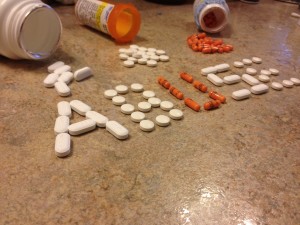
“I was 14. I went to a fire tower with a friend, and we sat in their car… we weren’t driving. We just sat there. And the person crushed them up, and then I snorted them. That was the first time I ever did them,” said a former Northwood student (who, for the purposes of this article, will be called Terry Smith), talking about the first time they got high by abusing prescription pills.
Smith was one of several students who was charged with the possession of and/or distribution of prescription pills around September and October.
“Teenagers—and even adults—are using pills… it’s a growing trend we’re seeing in America and in the schools,” school resource officer Herbie Stubbs said.
Students are able to get pills from drug dealers, their own bathroom cabinets or other students. Junior Lane Poag, who has two legal prescriptions, has been asked by other students to “share” before.
“At first I was kind of shocked… then I finally, sort of, manned up and was able to be like: ‘Hey, it’s not safe, and it’s dangerous, and you don’t need to, you know, be doing it. And if you want to, get it from somebody else,’” Poag said.
In the beginning, Smith primarily got pills from friends
“If my friends have it, then I have access to it. That makes it easier for me to try something I might not usually try,” Smith said.
Smith maintains that peer pressure did not factor into the use of those first few pills.
“I really just wanted to try,” Smith said.
Soon after, Smith started buying from drug dealers. Smith was expelled from school earlier this year for carrying out a drug deal on school grounds.
Due to the recent up-kick in pill related charges at Northwood and throughout the country, the school has been collaborating with a group of nine students from the University of North Carolina School of Medicine and their professor, Shawn Kneipp, on a pill abuse awareness campaign. The campaign made its debut in the form of a school-wide assembly held in early February.
Most, if not all of the students in the group have worked with addicts in the past. One student, Lydda De Guia, was employed at a place where she helped addicts try to regain their lives after rehab.
“I had met several people who started as teenagers with prescription drug use…you become friends with these people and… I just remember one day [one of them] ended up leaving [the sobriety program] because his parents wouldn’t pay for it anymore. Within a week he was dead,” De Guia said.
Another student in the group, Kai Moreb, witnessed a friend become addicted to pills when he was a teenager.
“Until about 10th grade we were really good friends, and then he started getting into other things… and about a year after we graduated, he went to rehab for the first time,” Moreb said. “He’s been to rehab at least three times since then. He’s currently in jail for armed robbery…. He went to go sell pills to a friend of his, and then robbed the guy for his money instead… so, it gets pretty serious.”
The physical risks pill abusers face are numerous. According to kidshealth.org, certain pills can cause heart failure, seizure, a decreased ability to think, decreased respiratory function and can induce coma. It is also widely known that repeated pill abuse can cause liver disease. Pills are just as easy to get addicted to as many street drugs—perhaps even more so, because of their availability—and they are notoriously easy to overdose on. In the US, one death because of prescription pills occurs every 19 minutes (drugfree.org).
Smith was aware of these risks, but used pills anyway. Smith attributes this to, at once, “liking the way they felt” and “being the kind of person that wants to try something at least once.” Smith claims to have been as careful as possible when using pills.
“The time I would say I was the most risky with a pill was drinking alcohol while doing pills. That can be very dangerous, if you drink too much, or do too many pills,” Smith said.
Some pill-using students at school think differently about the risks.
“I am not going to overdose because I am not stupid,” a female junior said.
Another female junior finds pills “more predictable because they’re designed for people, so you’re not going to have a bad trip, or really get sick unless you take a lot.”
In addition to physical risks, pill abusers face a number of legal risks that Adrienne Himmelberg, a member of the UNC group, dubs the “cascade of consequences.”
“Once you get that felony charge—which would be the person who has the prescription and passes it out, doesn’t need to sell it, just hands it to another person—once that person is charged with a felony there are a multitude of careers that they can no longer pursue: anything in the medical field, anything where you would carry a weapon, military, beautician’s license, hunting license,” Himmelberg said.
Melia Stanek, another student from the group, expressed a similar warning:
“These consequences can come down the line, even if you’re charged and it gets dismissed or expunged. It’s still going to affect you. It’s not, like, an ‘easy out’ pass.”
Terry Smith is currently undergoing the process of expungement. This is a legal procedure in which a first-time offender can attempt to have portions of their criminal record sealed or destroyed.
“I could say I’ve never been charged nor convicted, even though I really have,” Smith said.
Smith debates the ethics of this loophole.
“It does seem like you’re cheating the truth, that’s the thing…. Basically, it’s like you’re paying money to be innocent. Which, to me, seems like a corrupt way to handle it; and a somewhat deceitful way to handle it, but I’m going to use it since it’s available,” Smith said.
In the next step of the awareness program, the UNC students will create a web site on which they will address student questions and concerns about pill abuse. For additional support, there will also be two students from the group at Northwood every Tuesday.
“I’m glad we’re having [the pill abuse program] because I feel like it could change some people’s lives and make them look at life in a different point of view, and hopefully turn their lives around,” a male senior said.
Some of the students at the school who use prescription pills illegally look at the program in a different way.
“The pill abuse campaign isn’t going to change the problem—if there is a problem. It was funny, because we were just joking about it,” one female junior said.
— By Quinn Kerscher
Jessica Clayton contributed to this story.

